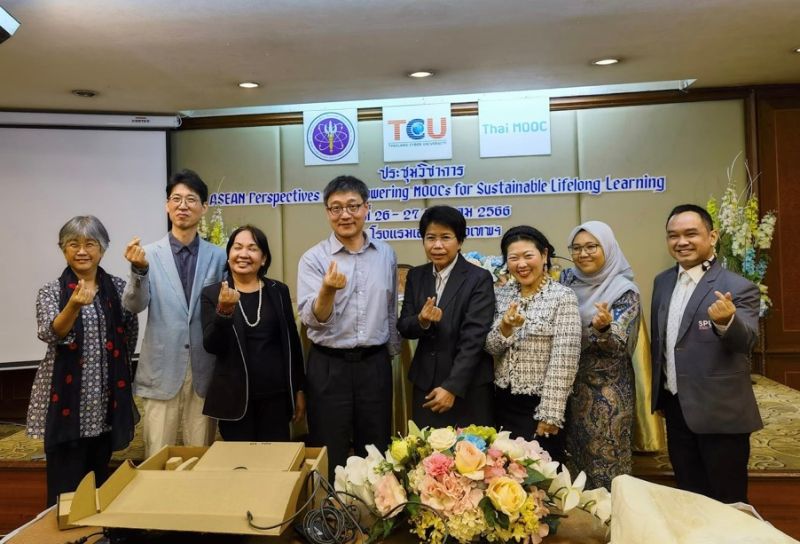
Dr. Bandalaria (3rd from left) wit the invited speakers from ASEAN-member countries. (Shared from Dr. Mel Bandalaria’s Facebook Page)
The University of the Philippines Open University Chancellor, Dr. Melinda dela Peña Bandalaria, was in Thailand for an experts’ meeting organized by the Thailand Ministry of Higher Education, Science, Research and Innovation through its Thailand Cyber University (TCU) Project. Titled “ASEAN Perspectives on Empowering MOOCs for Sustainable Lifelong Learning,” the hybrid event was held on 26-27 January 2023 at the Asia Hotel in Ratchathewi, Bangkok.
In Dr. Bandalaria’s presentation titled “Transforming Higher Education Through MOOC: Discourses that Shaped the 10 Years of Philippine Journey,” she provided a glimpse of the MOOCs structure and presented the Philippine MOOC initiative. She also presented the discourses that shaped the Philippine MOOC (PhilMOOC) journey as a public service function of UPOU. According to Dr. Bandalaria, PhilMOOCs are learning opportunities for out-of-school youths, they help improve the quality of education by providing free content of credit courses offered by many Higher Education Institutions (HEIs); and is a response to the Paris Message about higher education needs by 2023. In addition, she shared that PhilMOOCs is a response to the needs of the industry, specifically with the implementation of the 4th and 5th industrial revolution, and the PhilMOOCs will serve as gig learning for the gig economy.
Dr. Bandalaria further mentioned that a discourse which shaped the PhilMOOCs during the COVID-19 pandemic was on how MOOCs can best be used for inclusive, massive, and rapid training of teachers and school administrators. She shared that UPOU made use of MOOC and webinars to support as many academics and educational institutions as possible during the pandemic years, which enabled the university to reach more than 25,000 MOOC participants, compared to the pre-pandemic years where MOOC participants barely reached 3,000. Dr. Bandalaria also delved into how the quality of PhilMOOCs can be ensured, saying that existing quality frameworks for MOOCs are considered ie. frameworks of OpenupEd and the Commonwealth of Learning.
Additionally, Dr. Bandalaria introduced her own articulation of the quality of instruction in UPOU MOOCs, the ITeachIDEA framework, which stands for I – Institutional Support; Teach – teaching, support, and teaching-learning environment; I – IT Infrastructure; D – Design of learning and instruction; E – evaluation or continuous research and monitoring; and A – assessment of and for learning. In the end, she presented ways to make MOOCs sustainable and how to adopt learning in the future through MOOCs.
Along with Dr. Bandalaria are invited speakers from ASEAN-member countries. These include Dr. Nurbiha A. Shukar, Associate Professor and Deputy Director of the Center for Advancement in Digital and Flexible Learning, Universiti Teknologi Malaysia; Dr. Paulina Pannen, Professor and Chairman of the ICE Institute, Universitas Terbuka in Indonesia; Professor Heon Joo Suh, Professor and Director of External Affairs at UNESCO’s National Institute for Lifelong Education in South Korea; and Dr. Colitis Dhirathiti, Executive Director of the ASEAN University Network (AUN).
The objective of the event was to exchange knowledge between academics, researchers, faculty members, and students across the ASEAN countries. It was also organized to synergize collaboration and collect online education knowledge and best practices in all topics related to massive open online courses for sustainable lifelong learning.
Written by Anna Cañas-Llamas
Edited by Margaret Jarmin-Suarez
Photo from Dr. Mel Bandalaria’s Facebook Page (source)








